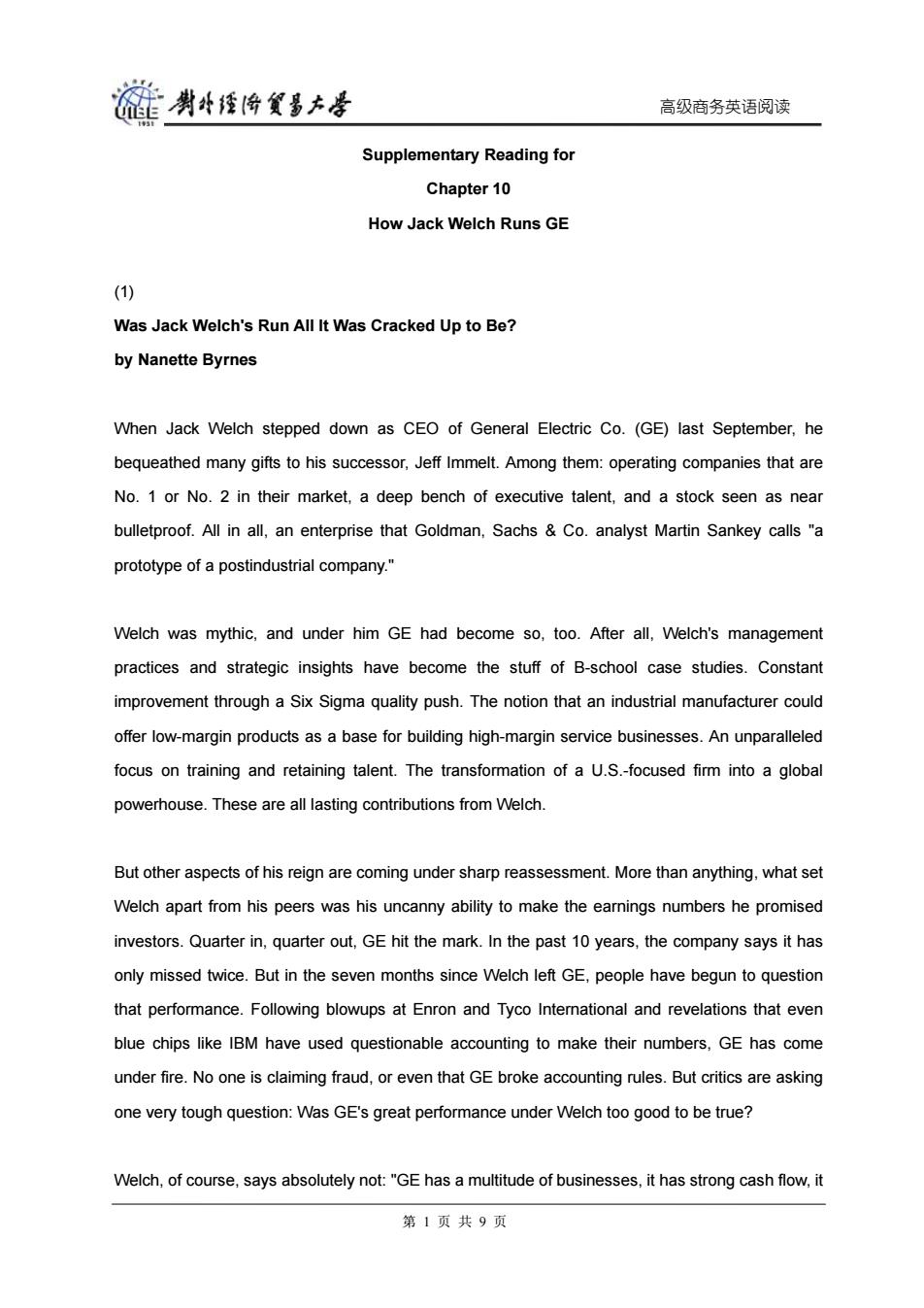正在加载图片...

旋剥经降贸墨去号 高级商务英语阅读 Supplementary Reading for Chapter 10 How Jack Welch Runs GE (1) Was Jack Welch's Run All It Was Cracked Up to Be? by Nanette Byrnes When Jack Welch stepped down as CEO of General Electric Co.(GE)last September,he bequeathed many gifts to his successor,Jeff Immelt.Among them:operating companies that are No.1 or No.2 in their market,a deep bench of executive talent,and a stock seen as near bulletproof.All in all,an enterprise that Goldman,Sachs Co.analyst Martin Sankey calls "a prototype of a postindustrial company." Welch was mythic,and under him GE had become so,too.After all,Welch's management practices and strategic insights have become the stuff of B-school case studies.Constant improvement through a Six Sigma quality push.The notion that an industrial manufacturer could offer low-margin products as a base for building high-margin service businesses.An unparalleled focus on training and retaining talent.The transformation of a U.S.-focused firm into a global powerhouse.These are all lasting contributions from Welch. But other aspects of his reign are coming under sharp reassessment.More than anything,what set Welch apart from his peers was his uncanny ability to make the earnings numbers he promised investors.Quarter in,quarter out,GE hit the mark.In the past 10 years,the company says it has only missed twice.But in the seven months since Welch left GE,people have begun to question that performance.Following blowups at Enron and Tyco International and revelations that even blue chips like IBM have used questionable accounting to make their numbers,GE has come under fire.No one is claiming fraud,or even that GE broke accounting rules.But critics are asking one very tough question:Was GE's great performance under Welch too good to be true? Welch,of course,says absolutely not:"GE has a multitude of businesses,it has strong cash flow,it 第1页共9页高级商务英语阅读 Supplementary Reading for Chapter 10 How Jack Welch Runs GE (1) Was Jack Welch's Run All It Was Cracked Up to Be? by Nanette Byrnes When Jack Welch stepped down as CEO of General Electric Co. (GE) last September, he bequeathed many gifts to his successor, Jeff Immelt. Among them: operating companies that are No. 1 or No. 2 in their market, a deep bench of executive talent, and a stock seen as near bulletproof. All in all, an enterprise that Goldman, Sachs & Co. analyst Martin Sankey calls "a prototype of a postindustrial company." Welch was mythic, and under him GE had become so, too. After all, Welch's management practices and strategic insights have become the stuff of B-school case studies. Constant improvement through a Six Sigma quality push. The notion that an industrial manufacturer could offer low-margin products as a base for building high-margin service businesses. An unparalleled focus on training and retaining talent. The transformation of a U.S.-focused firm into a global powerhouse. These are all lasting contributions from Welch. But other aspects of his reign are coming under sharp reassessment. More than anything, what set Welch apart from his peers was his uncanny ability to make the earnings numbers he promised investors. Quarter in, quarter out, GE hit the mark. In the past 10 years, the company says it has only missed twice. But in the seven months since Welch left GE, people have begun to question that performance. Following blowups at Enron and Tyco International and revelations that even blue chips like IBM have used questionable accounting to make their numbers, GE has come under fire. No one is claiming fraud, or even that GE broke accounting rules. But critics are asking one very tough question: Was GE's great performance under Welch too good to be true? Welch, of course, says absolutely not: "GE has a multitude of businesses, it has strong cash flow, it 第 1 页 共 9 页